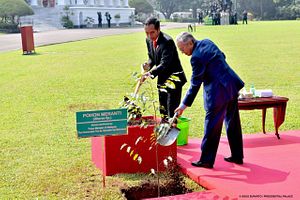This week, Indonesia and Malaysia held a meeting between their two military chiefs. The development was just the latest interaction between the two neighboring Southeast Asian states as they seek to manage the opportunities and challenges in the defense aspect of their relationship amid domestic and regional change.
As I have pointed out before in these pages, despite some disagreements on the security side that they continue to manage – ranging from illegal fishing to the outstanding Ambalat dispute, Malaysia and Indonesia do maintain a healthy overall defense relationship. One way in which security ties are managed is through a series of mechanisms, and one of the examples in this respect is the High-Level Committee (HLC) that tends to address security issues more specifically and features meetings between the defense establishments.
In recent years, both sides have tended to use the HLC meeting to either discuss ongoing progress or make new inroads on a range of military mechanisms, from air patrols to intelligence sharing to exercises. At the last iteration of the Malindo HLC was held in July 2017 in the Malaysian capital of Kuala Lumpur, for instance, one of the items made the headlines was the fact that they had agreed on a range of measures, from the exchange of military trainers to joint military exercises, to combat the shared threat from the Islamic State.
While both sides had already been working out details for this year’s iteration of the Malindo HLC meeting through several other defense interactions, the holding of the meeting itself and the wider dynamics of the bilateral relationship nonetheless remained interesting to watch given some changes in defense personnel on both sides during the year as well as the surprising change of government in Malaysia following elections in May (See: “What Does Mahathir’s Visit Mean for Malaysia-Indonesia Relations?“).
This time, the Malindo HLC was held in Indonesia, and Malaysia’s Chief of Defense Forces Zulkifli Zainal Abidin – who had just been placed in that role in June – and his delegation made the trip to attend it.
As is the case with Malindo HLC meetings, both sides took stock of the state of the various aspects of their defense relations – including intelligence sharing, security operations, as well as exercises and exchanges – across various issues from transnational crimes to maritime security.
Unsurprisingly, few specifics were publicly released regarding the details discussed by the two sides. An official Indonesian account of the meeting stressed that both sides had reviewed aspects of ongoing cooperation being implemented and also discussed ways to manage ongoing issues for the benefit of not just both militaries, but also the wider ASEAN region.
Additionally, Zulkifli also had a number of other engagements during his visit, including a meeting with Indonesian Defense Minister Ryamizard Ryacudu. Both sides discussed a number of contemporary security issues there that have been in the headlines of late, including terrorism and radicalism and the ongoing patrols between the two countries and the Philippines in the Sulu Sea.
There was little in the public accounts of the meeting that suggested any major change in the general trajectory of defense ties given the new government in power in Malaysia. Nonetheless, the evolution of the relationship will continue to be interesting to observe, as the Malaysian government’s foreign and defense policy takes shape during the rest of 2018 and into 2019, and Indonesia approaches its own presidential elections next year as well.

































